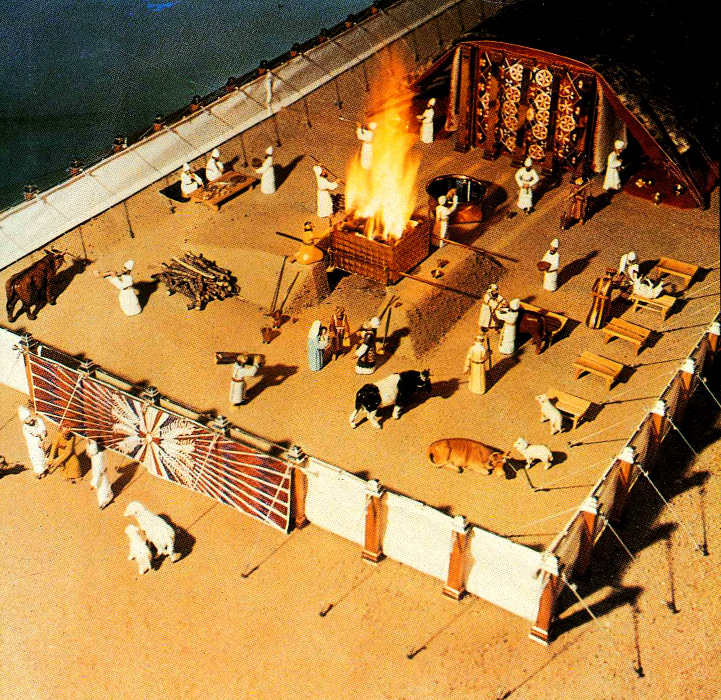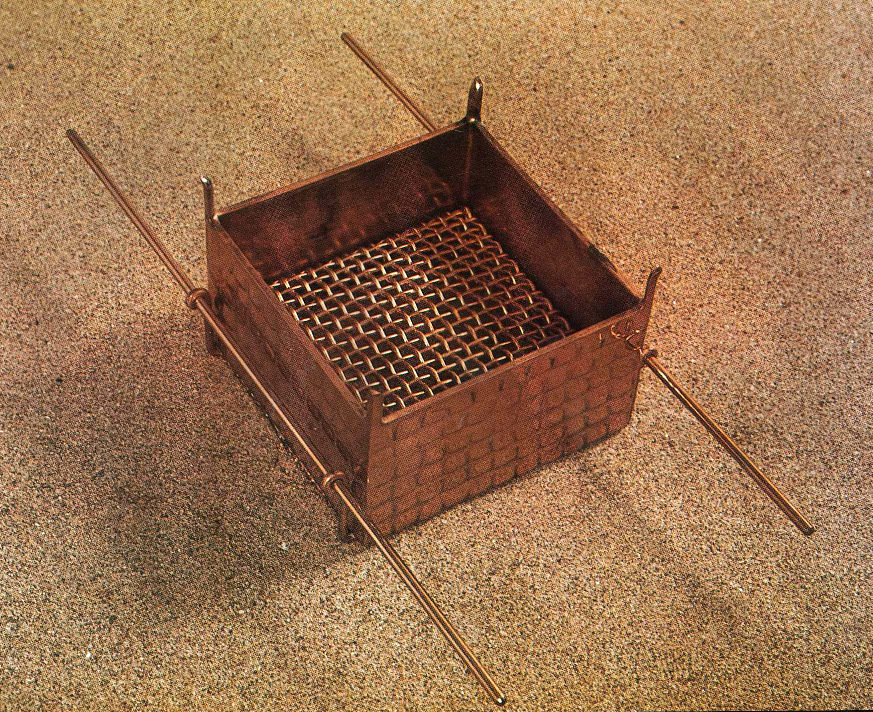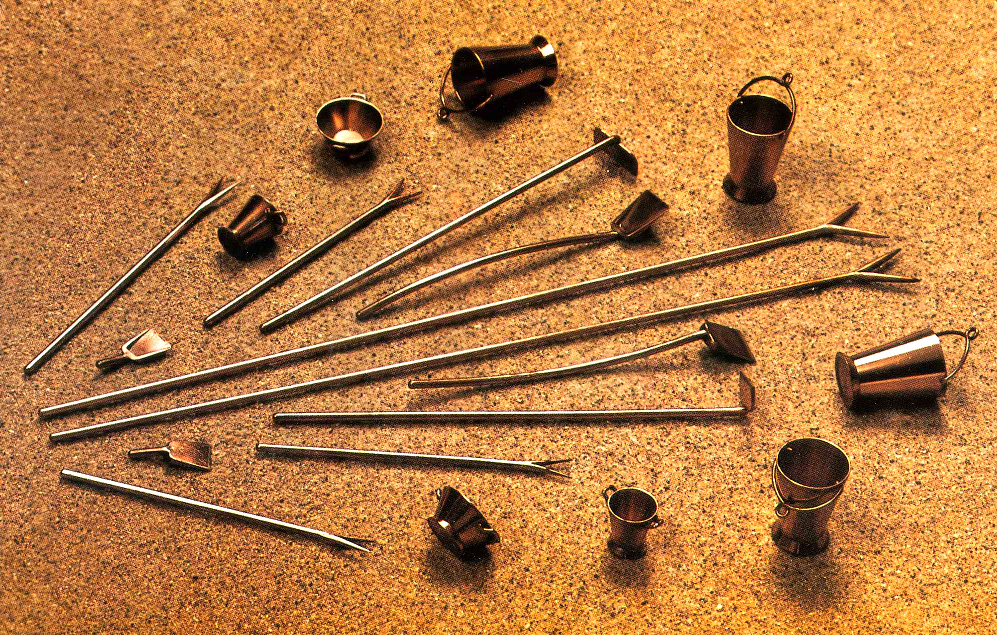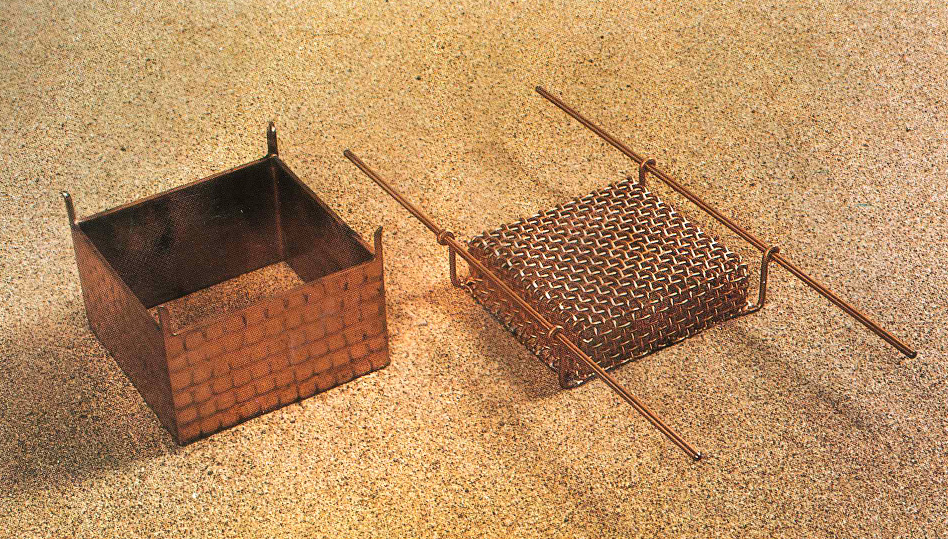
Click Here to download and/or print this lesson
Lesson by Brother Walt Durgeloh
Text: Exodus 27:1-8; 38:1-7
See pictures 5,6,7. An altar is by definition a place to slaughter, usually in sacrifice. It also means to do sacrifice, to kill, or to slay. Brazen altar means the place where judgment for sin was transferred to the innocent, from the guilty, for the sacrifice’s death.
Lev 5:5-10 How it was done, sin’s price paid.
2 Cor 5:21; 1 Peter 3:18 How it is done today, Jesus was the sacrifice for our sin.
The Brazen Alter of Brass
After passing the outer gate with its various colored curtains, the first thing that greeted the sinner was the altar of brass (judgment).
A. Judgment begins at the house of God
Proverbs 11:31 God will chasten or bless, especially His children.
Luke 12:46-48 Those that “know” God’s will and are not “doing” are judged harsher than those who are ignorant and not doing.
Romans 14:10 All the saved will face Jesus at the Judgment Seat of Christ. Just as all that passed through the Gate were, none were exempt.
1 Peter 4:17-19 Judged as a child of God, a member of His Church, is where to be.
The altar was anointed, and all “his” vessels, and God said it was most holy.
Exodus 40:10 The altar and all the utensils were set apart, to be used exclusively for God.
2 Timothy 2:20-21 Are we vessels of honor or dishonor? Is God able to use us in His service?
After this altar was anointed, it was dedicated by the twelve princes of Israel.
Numbers 7:10-11, 84-89 Each tribe participated in the anointing and dedication of the altar, giving offerings to show special work of the altar.
Hebrews 9:18-22 Moses sprinkled blood on altar to show true sacrifice that was to come.
We have an altar in New Testament time also
Romans 12:1-2 We are to present our lives a sacrifice for God’s service.
Hebrews 13:10, 15-16 Jesus is our sacrifice, our altar we are to sacrifice to daily.
1 Peter 2:5 We are priests, alive stones that make up His house, offering sacrifices to God that are only acceptable because they are through Jesus.
The Composition of the brazen altar

The altar was three cubits high and five cubits square;
Thus four square, 4.5 feet high by 7.5 feet long by 7.5 feet wide.
The altar had four horns
One on each corner for which to bind the sacrifice.
Psalm 118:27 bind the sacrifice to the horns of the altar.
Gen 22:9 As Abraham bound Isaac to sacrifice him.
As Jesus was nailed to the cross. John 20:25 (print of the nails in hands).
The altar was made of acacia wood and overlaid with a heavy layer of brass.
- Exodus 27:8; 38:7 The vertical brass walls were made hollow to put boards in and were completely sealed with brass (wood would not burn without oxygen). It would not have been common to have wood this close to a constant fire, but God was showing a pattern. This represents the twofold nature of Jesus. As the wood suffered through every sacrifice but was not consumed, so Jesus suffered in the flesh, alone, through His sacrifice.
- Psalm 88:7-9 As wood was isolated by brass, Jesus was alone on the cross.
- Matthew 26:74-75 Fear of man caused Peter to deny Jesus, Jesus was alone.
- Matthew 27:45-46 When Jesus took our sin upon Himself, the Father turned away (Psalm 22:1).
- Hebrews 5:8 Jesus suffered separation from the Father to do His will (obedience).
Was the altar ever changed after it’s initial construction?
- Num 16:36-40 How do we know it was the brazen altar and not the altar of Incense? Everything on the outside of the Tabernacle proper is of gold, on the outside is brass.
- Exodus 30:1,3; Hebrews 9:4; Revelation 8:3 (golden altar, golden censer)
- Num 16:40 The brazen censers were flattened and put on brazen altar as a memorial or warning that none other than the priests were to offer incense before the Lord.
The altar’s vessels were of brass. See picture 10.

- Pans to receive the ashes
- Shovels to shovel the ashes
- Basins to receive the blood
- Flesh hooks to handle the offerings
- Fire pans to remove the coals from the altar
- Pans to bake meat offerings
The altar had a grate or network of brass on which the fire burned. See picture 7.

Exodus 38:5; 27:5 (compass means ledge, net is grate).
The altar had two staves of acacia wood overlaid with brass to be put in the two rings on each side in order to bear it.
- Reminds us of the Godhead. God the Father and God the Holy Spirit in the two staves, bearing (carrying) God the Son (the sacrifice) to the world. Which is the gospel.
- 1 Cor 15:1-4 Carrying the news of Jesus to the world.
Fire was miraculously kindled and kept burning perpetually.
- Leviticus 6:12-13 Was to never go out. Shows the undying devotedness of Christ. Shows God is always ready to accept a person’s proper sacrifice (seeking forgiveness).
- Jeremiah 23:29; 20:9 God’s Word is like a fire in us that will endure.
- Leviticus 9:24 Fire came from God. 2 Chronicles 7:1-3 Same for fire in Temple.
- Heb 12:29 God’s fire is His judgment on sin, we should not refuse to serve God (v.25).
The “types” of the brazen altar
The three cubits of the altar stand for the three persons in the Godhead suffering the judgment of sin.
- The Father was the giver
- The Son was the sufferer
- The Holy Spirit was/is the wooer (draws, invites, petitions)
The altar was foursquare, the same on all sides, to show completeness and equality
- Romans 2:11; 3:23 All are treated the same, no exceptions.
- Acacia wood showed Jesus’ humanity
- Hebrews 2:14,17-18 Jesus took on the form of man, flesh. Jesus knows all our pains and trials, having experienced everything we could ever go through.
Blood and Ashes
- Lev 1:11; 4:7 Blood was sprinkled upon the altar and poured out at the bottom.
- Psalm 22:14 This pictured our Saviors blood being shed and poured out at Calvary.
- Lev 6:11 Ashes were carried outside the camp.
- Numbers 19:9, 16-19 Ashes used to make “water of separation”. Used to purify an “unclean” person. Interesting that in our time, ashes are used to make soap, where “Lye” comes from.
Two significant facts were associated with the horns of the altar:
- There the innocent victim was bound as the blood was shed.
- Our Heavenly sacrifice was bound to the horns of the altar, as it were, by the cords of love. Matthew 27:40-43 His love for us and obedience to God’s will kept him from saving Himself. He willingly gave His life, laid Himself on the altar.
- It was His love that led Him from Heaven’s glory to Calvary.
- When He set His face steadfastly toward Jerusalem and that altar that was His cross, He knew the anguish of soul, the suffering, and the sorrow that He was to bear for a guilty world.
- The horns of the altar were sprinkled with the blood of the sacrifice. Exodus 29:12 To picture, Calvary’s cross was stained with the precious blood of our Lord Jesus Christ.
- The guilty fled for refuge to the horns of the altar.
- Adonijah and Joab 1 Kings 1:50-53; 1 Kings 2:28-34 Refuge could be found at the altar just as we can find refuge. Judgment is still given out though.
- The sinner must come to Christ for safety from the righteous judgment of God.
- The four horns on the four corners of the altar pointed to the four corners of the earth, thus salvation is extended to all mankind. Isaiah 45:22 Salvation is available to all.
The four rings of the altar.
Four things Christ was made for us 1 Corinthians 1:30
- Wisdom
- Righteousness
- Sanctification
- Redemption
The altar was covered with badger skins when moved
Numbers 4:14
- No beauty Isaiah 53:1-2; 1 Corinthians 2:14
- Marred more than any man Isaiah 52:13-15
- Covered, or hid 2 Corinthians 4:3-6 We see the beauty of God, the world sees foolishness.
There was only one recognized altar of sacrifice.
- It could not be substituted in the approach to God. We need to apply this to false altars today.
- 1 Kings 12:28-30; 13:34 Jeroboam’s attempt to build more altars to God was sin.
- Eph 4:3-6 God recognizes “one”.


